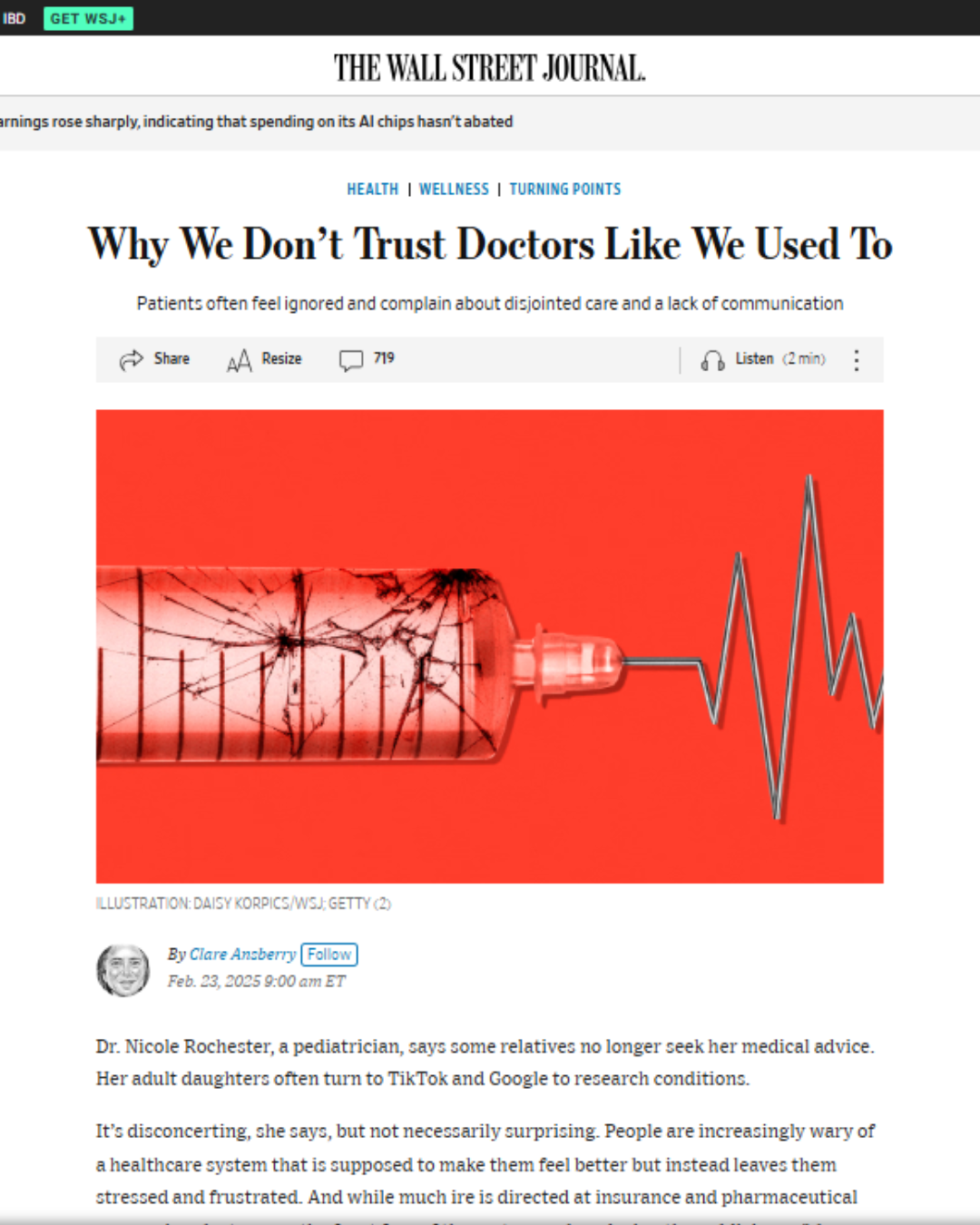There have been numerous changes to the way health care is delivered in the United States. Regulatory agencies, electronic medical records and insurance companies have altered the way physicians practice medicine. One of the unfortunate consequences has been the erosion of the doctor-patient relationship. Many patients don’t trust their doctors anymore. With less time for meaningful communication, patients can feel like they are “just a number” or that their physician doesn’t care about them. I can tell you that nothing is further from the truth. The real truth is that many doctors are struggling to meet the demands of these outside forces while still trying to provide personalized care to their patients. There are some common misunderstandings that contribute to the increasing mistrust patients feel toward their doctors. In this post, I discuss five that I consider to be very important.
- Your doctor makes decisions based on what is best for you and your medical condition, not on which services are covered by your insurance company.
Every health insurance company has multiple benefit plans. Each plan differs in the services covered and how the costs are shared between the insurer and the patient. Large employers are typically able to negotiate better rates and services than small businesses or individual plans. It is impossible for your physician to know what every insurance plan covers. Similarly, your doctor does not know how much your insurance company will bill you for services rendered. It is good that we don’t know this information, because it allows us to do what we do best—care for patients. When we recommend lab tests or radiologic studies, it is because we feel we need more information in order to diagnose you accurately and provide the most appropriate treatment. Please comply with your doctor’s recommendations and inform her if a service is being denied by your insurance company so she can help you file an appeal. (See “How to File an Appeal When Your Insurance Company Refuses to Pay” for more information about how to file an appeal.)
- Your doctor would love to spend more time talking with you during your visit.
The overwhelming majority of doctors chose the field because they want to help people. Those of us in primary care specialties (internal medicine, family medicine, pediatrics, geriatrics) generally love talking with our patients. We were taught in medical school that “history is everything”. This is a dogma referring to the fact that a physician can accurately diagnose most medical conditions by taking a very careful history (a thorough account of the patient’s symptoms and how they developed). In an ideal world, your doctor would sit and talk with you for an unlimited amount of time, answering all of your questions and addressing each of your concerns. HOWEVER, most physicians rely on insurance reimbursements for payment of services. Because those reimbursements are typically a small percentage of what the physician actually charges, the only way to “break even” is to see more patients. The only way to see more patients is to spend less time with each patient. If physicians don’t see enough patients, they will not be able to keep the doors of their practices open. This is the business side of medicine and an unfortunately reality that must be acknowledged.
- It is nearly impossible to adequately address more than one serious medical problem in one visit.
This is closely related to #2. I know it can sometimes be difficult to get an appointment with your physician, so some patients want to discuss all of the problems they’ve experienced since the last visit. Or maybe the financial burden of paying multiple copays causes you to want to address everything in one appointment. However, please understand that this is not in your best interest. In order to make an accurate diagnosis, your doctor needs to gather information about your symptoms and perform a physical examination. During this encounter, you want your doctor’s undivided attention on the most significant problem that you have—the one that is causing you the most discomfort and/or can have devastating consequences if left untreated. If you make an appointment for dizziness (as an example), but then mention a pain you’ve had in your leg for a few weeks, a rash on your arm, and an occasional upset stomach, it will be very difficult for your doctor to devote adequate time to any of your concerns. The likelihood of him missing something important has now increased. It is better to schedule a separate appointment if you have multiple concerns (assuming they are not life-threatening).
- When you regularly seek care from providers other than your primary care physician and specialists, the quality of your health care may be compromised.
I am a busy physician, entrepreneur, wife, and mother. I understand firsthand the value of convenience. There is nothing wrong with an occasional visit to an Urgent Care center or a Minute Clinic. However, these facilities are primarily designed for acute, episodic care. They are great for injuries, upper respiratory infections, sore throats, etc., and can be an invaluable resource if you become ill while out of town. However, if you have a chronic health condition you should not attempt to replace your primary care physician or specialist with an urgent care facility, just because you can be seen the same day. Your doctors have been following the progression of your illness and have meticulous records about your previous visits, medications, and test results. Until we have a universal electronic medical record (don’t hold your breath on this one), other providers are relying completely on the information you provide. In addition, the information about your urgent care visit may not be communicated to your primary care provider. This creates a critical disconnect in your medical care, and one that can be detrimental.
- If your symptoms change or worsen after being seen, your doctor needs to be informed.
Your doctor has a wealth of experience, but he cannot predict the future. Additionally, you probably already know this, but sometimes your doctor is wrong. After reviewing your symptoms and performing a physical exam, your physician will consider a number of options. The next step is to narrow the options to one diagnosis based on his knowledge and experience with what is most likely. When your doctor talks with you about your diagnosis and explains what to expect, he is describing the typical course for that condition. In most cases, you will have been given the correct diagnosis and things will unfold as described. However, there are two other possibilities: 1) Your diagnosis may be incorrect; 2) Your condition may worsen unexpectedly due to a complication or progression of illness. There is no way for your doctor to know that either of these has occurred without hearing from you. If you are getting worse or are not improving in the time frame that was discussed, please contact your physician so that you can be re-evaluated. Sometimes this additional information will make your diagnosis more clear, or may signal a complication that warrants immediate attention.
Despite changes in our health care system that have disrupted the traditional doctor-patient relationship, there are things that you can do to maintain this critical connection. As always, my goal is to provide you with inside knowledge so you can create meaningful relationships with your health care providers and feel empowered to get the excellent care that you deserve.
I’d love to hear from you! Leave a comment if you’ve learned something from this post or if you have experiences that highlight any of the tips provided in this article.
Have you joined the Your GPS Doc Family? If not, please click here to receive notifications about new content as well as useful worksheets and additional resources only available to Your GPS Doc subscribers.








I understand what you’re saying but I’d have to politely disagree with 1, 2, and 3. The doctors I have experienced listen and listen carefully. They go beyond expectation. #4 is painstakingly true. Especially when you get admitted to a hospital and all they have is hospitalists and not your primary care or specialist involved. My family members’ doctors had to cuss out many hospitalists because of this and changing their meds. Great read!
Thank you so much for your comment, Crystal! I am incredibly happy that you have had such positive experiences with your doctors. I have a wonderful primary care doctor who listens carefully and provides detailed responses to my concerns. As a physician, I can attest to the fact that sometimes we are not able to do this as effectively as we would like. I am also a hospitalist and I agree that this care model can create disjointed care, particularly if the hospitalist physicians are not in contact with the primary care doctors and specialists who know the patient best. Good two-way communication is key! I hope you will take the time to read some of the other articles and please let me know if there is another topic you’d like to hear about.